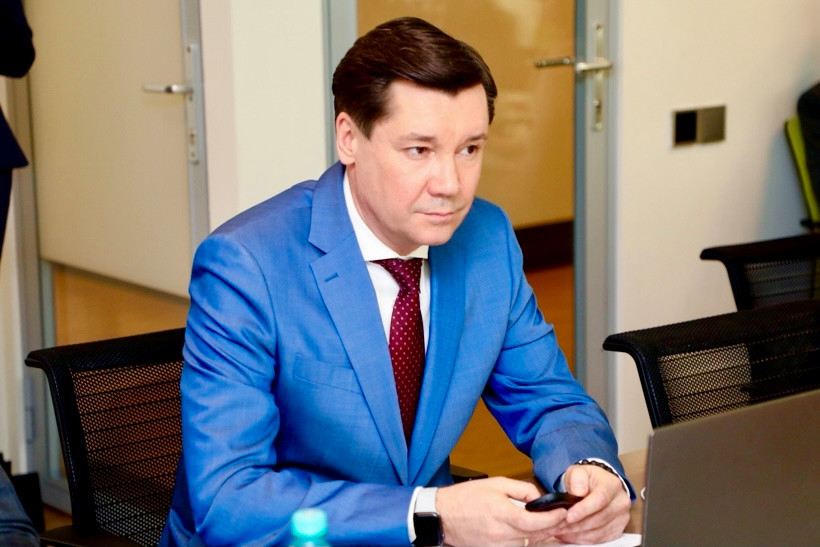You are currently in Russia. How do you perceive your mission to represent Belgian and Luxembourg companies there?
Oleg Prozorov: Until recently, the main focus of the chamber's activities was based on public meetings, on the visibility of our actions. Now we have gone into a bit of a submarine mode. We try to stay on the spot, but not to be too visible so as not to be criticised for this visibility. But the chamber's position remains unchanged. We intend to maintain relations between Belgian, Luxembourg and Russian companies, especially as we have more than 80 production units in Russia belonging to our members. These 80 units were mainly built in years when the Belgian and Luxembourg governments, as well as the European community, supported these facilities. Abandoning them would be an economic loss, but above all a loss of skills and personnel.
What is your day-to-day work like there?
We remain in close contact with the Luxembourg and Belgian embassies in Russia, the Luxembourg Chamber of Commerce, the various ministries and companies. We try to visit the companies on a daily basis, to see what their situation and concerns are. The most important thing at the moment is to keep the ground for the future, because after every war there is peace. After every crisis, there is an economic upturn.
We have more than 80 production units in Russia belonging to our members (...) Abandoning them would be an economic loss, but above all a loss of skills and personnel.
How would you describe the business climate for your members?
The business climate is of course built on the trust that has been forged over the years. Between the lands of Belgium, Luxembourg and Russia, there are centuries of bilateral trade. There is also a climate of expectation of future détente. The most important thing is not to lose contacts, customers, but also employees. Everything is based on trust, especially after two years of the pandemic when this contact was mainly at a distance.
What realities are your members facing?
Exporting companies are the most affected. There is a complete halt to all bilateral trade, as there is practically no way to make payments from Russia to Belgium and Luxembourg. In Luxembourg, things are going more or less well because there are more banking skills. In Belgium, on the other hand, it is much more difficult because the money arrives in forwarding accounts in the banks and sometimes remains there for more than a month without being paid into the companies’ accounts. This creates both delays and uncertainties. There are also cases where the money eventually returns to Russia without ever reaching its destination.
There is a complete halt to all bilateral trade, as there is practically no way to make payments from Russia to Belgium and Luxembourg.
Another challenge is to obtain all the authorisations from customs and the services responsible for ‘dual use’ authorisations (in export matters, ‘dual use’ refers to technology that can be used for both civilian and military purposes, editor’s note). Indeed, today, all products fall into this category. For example, bread can be used to feed soldiers as well as populations.
There is also the problem of deliveries. If you have received the money and obtained the permits, you still have to be able to deliver. Boats are no longer allowed in the ports. Trucks can no longer cross the borders. They have to be unloaded, for example at the Belarusian border, and driven by a national of the Eurasian Union.
Aren’t Belgian and Luxembourg companies operating in Russia also exposed to certain legal risks?
We are indeed very concerned, as are other European and American associations, about what one can read in the Russian press about the risk of nationalisation or the risk of a correctional sentence for compliance with European sanctions in Russia.
Have any of your members withdrawn from the Russian market?
Yes, some companies have taken this decision. I don’t think they did it under pressure, but because it was no longer economically feasible to continue.
What are the difficulties for Russian companies in Belgium and Luxembourg?
It is quite difficult for these companies because there is now a ‘cancel culture’ movement to erase all Russian economic and cultural relations. Of course, there are also difficulties related to payments and logistics. Furthermore, economic operators are very cautious about all the publications in the press, especially those relating to confiscations and asset freezes. Some companies are now looking to other jurisdictions around the world.
There is now a 'cancel culture' movement to erase all Russian economic and cultural relations.
You will participate in the St. Petersburg International Economic Forum (SPIEF) from 15 to 18 June. What is your objective?
Our interest is to preserve what has been built over the years by good hands. We are participating in the St Petersburg forum because we are historically the official regional partner. It also remains an international place, allowing us to exchange, not only with other international chambers of commerce, but also with other Russian regional associations. It should be noted that there are about 80 regions in Russia. Belgian and Luxembourg companies have a large presence there, as their production facilities are located outside the capital.
We also consider that we have to maintain contact with all regional governments with whom we do not discuss political issues, but permanent issues, such as the continuation of licences. All Russian entities with Belgian or Luxembourg shareholders continue to operate. They must therefore comply with their legal obligations, such as tax declarations, payment of taxes or customs declarations.
This interview was first published in French on . It has been translated and edited for Delano.



